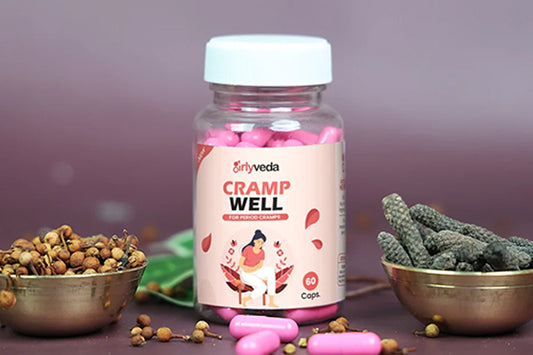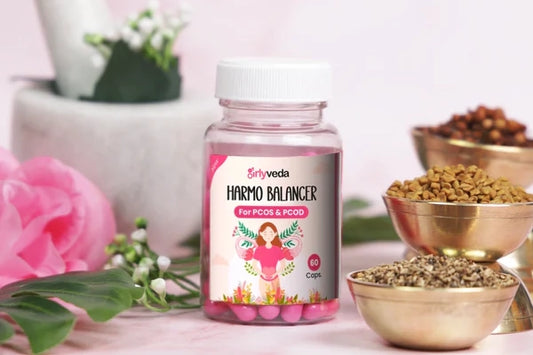How to Boost Fertility for Women Naturally with Diet and Lifestyle?

Each woman loves conceiving and becoming a mother after enjoying her married life for a few months or years. It is not equal to all married females. Some of them find it easy, while others have to make several efforts, or even need medical consultation.
If you or a close one faces conception issues, you start looking for tips on how to boost fertility for women. You can improve your fertility or conception chances by taking proper care of your body and mind. In this post, learn about the following points after a few basics:
- Fertility boosting foods for females
- Ayurvedic medicine for female fertility
Why Do Some Females Struggle to Conceive?
Inability to conceive is infertility. According to the World Health Organisation, around one in each six people of reproductive age suffers from infertility in their lifetime. Approximately half of the infertile people are females.
As a female, you face it due to several factors like poor ovulation, bad diet, irregular menstrual cycles, fibroids, PCOS, polyps, structural damage in the fallopian tubes, and endometriosis. In addition, infertility in females occurs due to early menopause, uterine adhesions, family history, environmental pollution, chemical exposure, and ageing.
How to Boost Fertility for Female
Regulating hormones and taking proper care of your body can help you enhance your chances of getting pregnant. Here are some natural ways/tips to improve fertility in females:
1. Always Eat A Fertility-Friendly Diet
Eating a balanced and healthy diet is essential for general health and overall well-being. It becomes even more critical when trying to conceive naturally. So, you should focus on taking a fertility diet.
Here are a few science-backed fertility booster foods that you should include in your diet:
- Antioxidant-rich Foods - Such foods contain a higher amount of lutein, folate acids, vitamins C and E, and beta carotene. These antioxidants are available in whole grains, nuts, fruits, and vegetables.
- Omega-3 Fatty Acids - Chia seeds, fatty fish, flax seed, walnuts, and flaxseed oil.
- Fibre-rich Foods - A 2020 NCBI study has found that a diet rich in fibre and lower in added sugar helps females increase their fertility. Some examples of fibre-rich foods include beans, whole grains (such as barley), fruits, and green & leafy vegetables.
- No Refined Carbs - Carbohydrates present in wheat, rice, and maize, for instance, are helpful. However, refined carbs, such as those found in white pasta, bread, and packaged food items, can be harmful to your fertility.
- Higher amount of protein - Consuming proteins found in meat, mutton, and pulses is beneficial. However, a 2019 study, published as "Nutrition and Female Fertility - An Interdependent Correlation," has found that plant-based proteins, such as lentils, are more beneficial for female fertility.
2. Consume Ayurvedic Medicine for Fertility
A healthy diet is essential. To maximise your conception chance naturally, consider taking herbal fertility medicine for females. Such fertility medicine is formulated using natural herbs like methi, kachnar, ashok chhal, ashwagandha, shivlingi beej, and shilajit.
Here is how an Ayurvedic pregnancy capsule, tablet, or supplement works:
- Regulate menstrual cycles.
- Lower excessive vaginal discharge.
- Maintain a healthy body weight and blood sugar.
- Enhance egg release and quality.
- Balance hormones
- Reduce stress & anxiety
3. Be Physically Active
Exercising regularly offers several health benefits, such as managing body weight and improving fertility. According to a 2017 study published in the Oxford Academic Journal, engaging in moderate exercise has positive effects on both male and female fertility, particularly in individuals with obesity.
Here are some examples of physical activities or exercises you should do:
- Walking for 30 minutes a day or 150 minutes a week.
- Cycling
- Jogging
- Swimming
- Sweeping with a broom
- Going up and down stairs
4. Take Enough Rest
Taking a rest is essential for each person. Trying to get pregnant can bring extra stress to your life, and this can be a barrier to your rest/sleep. A 2018 study titled "The Relationship Between Stress and Infertility" has confirmed that stress badly affects periods, leading to fertility issues.
Here are what you should do to manage stress and ensure enough rest:
- Meditate for 10-15 minutes daily.
- Practice deep breathing techniques like anulom and vilom.
- Squeeze a ball.
- Do backcounting.
- Consult a professional psychologist or psychiatrist if managing stress gets tricky.
5. Limit Your Caffeine Intake
The connection between fertility and caffeine is not immediately apparent. Many reproductive health experts recommend that couples lower their caffeine consumption while trying to conceive.
A 2020 review titled " Relationship with Caffeine Intake and Fertility" suggests it might not be necessary. However, it is recommended that you limit your caffeine intake to improve your chances of conception.
Instead of taking coffee, a primary source of caffeine, include the following beverages in your daily life:
- Lemon water
- Golden milk
- Apple cider vinegar
6. Keep Your Body Weight Healthy
Both being underweight and overweight can affect your fertility by interrupting your ovulation and menstrual cycles. A 2020 study (Obesity and Infertility: A Metabolic Assessment Strategy to Improve Pregnancy Rate) states that 5% weight loss and lowering BMI can help females increase their fertility.
A healthy BMI (Body Mass Index) ranges from 18.4 to 24.5. While trying to conceive, regularly monitor it and try to keep it within a healthy range.
7. Avoid Having Alcoholic Beverages
A 2017 report published in Scientific Reports states that drinking alcoholic beverages can negatively impact fertility in females. It states that you should not take 12 ounces of beer and 5 ounces of wine. Leave it completely for a safer and healthier pregnancy.
8. Consult an Experienced Gynaecologist or Reproductive Health Expert
If you notice your own effort does not help you get pregnant, consult a gynaecologist in your locality. Have a close interaction with the expert and explain everything that you are experiencing. Under the reproductive health expert guidance:
- Track your ovulation to predict the ideal fertility window.
- Measure your basal temperature.
- Check cervical mucus.
Conclusion
Particular lifestyle and health strategies might help you boost fertility for women. If you are trying to get pregnant and your efforts do not bear fruit, consulting an experienced gynaecologist will be beneficial and can help you conceive soon.









Thoughts on "How to Boost Fertility for Women Naturally with Diet and Lifestyle?"